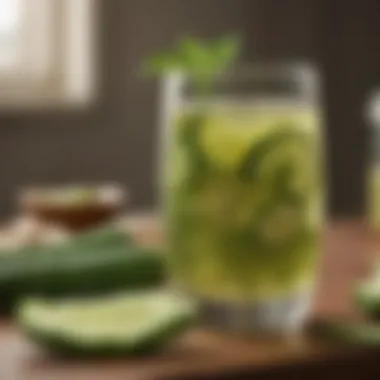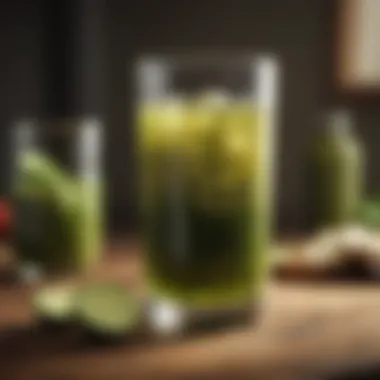Unlocking the Surprising Advantages of Pickle Juice


Intro
Pickle juice may not be the first thing that comes to mind when thinking about health and wellness, but this tangy liquid packs quite the punch. Often relegated to the sidelines of the culinary world, it’s high time this underestimated drink steps into the spotlight. At first glance, it’s a simple byproduct of pickling cucumbers, yet when you take a closer look, you begin to see its multifaceted advantages.
In this article, we’ll explore the nutritional profile of pickle juice, its assorted health benefits, and unique culinary uses. Whether it’s about hydration, muscle recovery, or simply enhancing the flavor of your dishes, pickle juice could very well become your new best friend. So, whether you’re health-conscious, a fitness enthusiast, or just love experimenting in the kitchen, there’s a wealth of information awaiting you.
Recipe Overview
Recipe Name and Description
Tangy Pickle Juice Elixir – A rejuvenating blend utilizing the natural benefits of pickle juice, combined with fresh herbs and lite spices to create a drink that not only refreshes but also supports muscle recovery and hydration.
Cuisine Type
This elixir blends elements from both traditional American comfort food and artisanal vinegar-based drinks. You can find it in various forms across different palates, spanning from sports recovery drinks to gourmet culinary concoctions.
Ingredients List
Detailed Ingredient Breakdown
- Pickle Juice: The star of the show; it’s often loaded with electrolytes, sodium, and vinegar.
- Fresh Dill: This herb brings a burst of flavor and is known for its anti-inflammatory properties.
- Lemon Juice: Enhances the freshness while adding vitamin C, a natural antioxidant.
- Cayenne Pepper: Just a pinch for added kick, this spice can boost metabolism and circulation.
Substitutions for Dietary Needs
If you are watching your sodium intake, consider using low-sodium pickle juice. For a vegan option, ensure that any added ingredients, like broth, are plant-based. Lastly, feel free to swap cayenne pepper with a milder spice if heat isn't your preference.
Remember: Any variety of pickle juice can be used; the more robust the flavor, the more invigorating the drink will be.
In products like this, the blend of taste and health functions coalesces beautifully, offering an experience that goes beyond mere refreshment. This elixir serves not only as a hydrating option but also as a nod to inventive culinary practices. Let’s delve deeper into the specific benefits that pickle juice can provide.
Prolusion to Pickle Juice
When one thinks of pickle juice, images of a briny liquid left behind in a jar of dill pickles may come to mind. However, this overlooked beverage has gained attention in recent years for its potential health benefits and versatility in culinary applications. The significance of this discussion cannot be understated, as more health-conscious individuals and culinary enthusiasts are starting to explore ways to incorporate pickle juice into their daily routines.
Picking up on the importance of pickle juice goes beyond mere curiosity; it dives right into a world where history, tradition, and nutrition converge. Whether used as a recovery drink post-exercise or as a flavor enhancer in various dishes, pickle juice proves to have something for everyone. Not only does it cater to health needs, but it also encourages creativity in the kitchen.
Historical Context
Historically, pickle juice isn't just a modern gimmick. Its roots stretch way back to ancient civilizations, where preserving cucumbers in brine was both a culinary necessity and a method for extending shelf life. The Egyptians, Romans, and Greeks enjoyed pickles—both for their flavor and health benefits—relying on them to help ward off ailments.
In Europe, the consumption of pickles and their juices has long been associated with sailors who relied on these briny supplies to combat scurvy during long voyages. Fast forward to today, and you’ll find that the tradition lives on; methods to produce pickle juice have persisted, adapting to contemporary tastes and health needs.
Culinary Uses
The uses of pickle juice in cooking stretch far and wide, making it a secret weapon in the culinary toolkit. From marinating meats to jazzing up salads, this tangy juice brings a distinctive punch that can elevate mundane dishes.
Here’s how pickle juice shines:
- Meat Tenderizing: The acidity in pickle juice can break down protein structures, allowing cuts of meat to become tender. A simple soak in pickle juice can transform a tough cut into one that's juicy and flavorful.
- Flavor Enhancement: A splash of pickle juice can add a surprising zest to dressings, dips, or sauces. It ties together flavors, creating a delightful balance in taste that can make the dish unforgettable. Consider adding it to potato salad or slaw—it's a game changer.
Encouraging a fresh perspective can lead culinary enthusiasts to experiment with pickle juice in beverages as well. Releases of traditional pickle juice shots or mixers in cocktails make this ingredient not just a side note, but a main player in modern gastronomy.
"Pickle juice is not just a briny leftover; it’s a punchy elixir layered with history, flavor, and wellness potential."


As we navigate through the various sections of this article, it will become evident that pickle juice is more than an afterthought. From its rich historical backdrop to its delightful culinary applications, the journey is just starting, showcasing all the ways this underappreciated liquid can make its mark.
Nutritional Composition
Understanding the nutritional composition of pickle juice underlines its role as a health booster. Packed with essential nutrients, pickle juice can not only quench your thirst but also deliver a significant punch of benefits too. Let's dive deeper into its components and what they mean for our body.
Electrolytes and Hydration
Electrolytes play a key role in maintaining the balance of fluids in our body. When we're sweating it out during a workout or simply feeling a bit dehydrated from a hot day, our electrolyte levels can dip. Pickle juice contains sodium and potassium, two critical electrolytes our body needs. Sodium helps retain water, while potassium assists in cellular function. This dynamic duo helps combat muscle cramps, fatigue, and even dizziness after strenuous activities.
Consuming pickle juice may offer swift hydration, making it a useful choice for athletes. Some studies suggest that even a small amount, say a shot glass worth, can be beneficial post-workout to restore balance.
Vitamins and Minerals
Vitamin K
Vitamin K is often underrated but plays a crucial role in maintaining our body's health. This vitamin assists in blood clotting, which is vital in preventing excessive bleeding. Moreover, it contributes to bone health by aiding in calcium absorption.
What's particularly interesting about vitamin K found in pickle juice is its availability. Unlike supplements, which may not be as readily absorbed, the presence of vitamin K in pickle juice can be a great natural source. Integrating pickle juice into your diet could bridge that gap in your vitamin K intake. While it may not be your go-to source, it certainly serves as a supplemental boost.
Sodium
Sodium, often viewed negatively in dietary discussions, is critical in moderation. Pickle juice has quite a bit of sodium due to the pickling process, which raises its levels significantly. This can be a boon for athletes; post-exercise, replenishing lost sodium can help prevent dehydration.
However, it’s essential to tread carefully. High sodium intake may not be suitable for everyone, especially those with hypertension or other health conditions. The key takeaway lies in balance; consuming pickle juice might just augment your regimen without going overboard.
Potassium
Potassium deserves its spotlight too. This mineral helps regulate heart rhythm and muscle contractions while also playing a role in regulating blood pressure. What makes potassium from pickle juice appealing is its bioavailability—how easily our body can absorb it.
Its presence in pickle juice can provide a nice balance to sodium, working together harmoniously. It's particularly advantageous for those looking to maintain electrolyte balance after intense workouts or during hot weather. If you're looking for a convenient source of potassium, pickle juice can serve as an efficient ally in your diet.
Health Benefits of Pickle Juice
When diving into the realm of pickle juice, one must not overlook the myriad of health benefits it offers. Scientifically and anecdotaly, this humble liquid emerges as a significant contender in discussions surrounding hydration, recovery, and overall wellness. Specifically, its contributions to muscle recovery, digestive health, blood sugar regulation and electrolyte balance paint a compelling picture for those curious about adding this unconventional item to their diets.
Muscle Recovery
Electrolyte Balance
Electrolytes play a key role in our bodily functions, serving as vital components for maintaining nerve function and muscle contractions. Pickle juice’s natural makeup includes important electrolytes, such as sodium, potassium, and magnesium, that help restore balance after physical activity. The distinctive characteristic of this pickle byproduct is its effective way of helping athletes bounce back after strenuous workouts.
For instance, after a long jog or a good lifting session, the body's needs extend beyond just water. An athlete might find that sipping pickle juice could aid recovery far more than plain water can. A unique feature of the electrolyte balance provided by pickle juice is how quickly they can be absorbed, making it a particularly popular choice for those in competitive sports or high-intensity training sessions. However, one must be cautious; excessive consumption can lead to sodium overload, particularly for anyone with certain health conditions.
Reduced Muscle Cramps
Experiencing muscle cramps can feel like a cruel joke during or after intense physical exertion. In this context, pickle juice demonstrates its worth again. The quick consumption of pickle juice may provide relief from cramps due to its analgesic properties. This specific aspect of reduced muscle cramps highlights how rapid intake can ease discomfort almost immediately.
One key characteristic is that more than just the electrolytes work here; the vinegar in pickle juice also seems to play a role in muscle relaxation. Many athletes swear by its efficacy, citing how a shot before or after workouts can stave off those inconvenient cramps. Notably, this method is not without its quirks—what may work wonders for one person might not for another, as individual responses can vary widely.
Digestive Aid
Probiotics Content


Pickle juice isn’t just a utilitarian beverage; it boasts a fascinating element—the probiotics. These beneficial bacteria can be highly advantageous for promoting digestive health. A commonly noted fact is that a good gut flora supports not only digestion but also immunity. The natural fermentation process that produces pickle juice gives it a probiotic boost that contributes fundamental life to our microbiota.
The brilliance of probiotics lies in their positive influence on gut health. A relative newcomer in some diets, it is specially valuable for those who might be experiencing digestive discomfort or suffering from irregularities. While it’s not the sole solution to digestive woes, pickle juice may just provide the supplementary support some are looking for, especially when coupled with a balanced diet.
Improved Gut Health
With improved gut health, a plethora of benefits come into play—better absorption of nutrients, reduced inflammation, and an overall feeling of well-being. Integrating pickle juice into a daily routine might just be that unexpected lifeline for individuals struggling with gastrointestinal issues.
The ability of pickle juice to assist in this way is not a panacea; it works best in synergy with other healthy lifestyle choices. Still, its unique properties make it an appealing option to enhance digestive health. Those advocating for its use often share tales of revitalization, making it more than just a tangy drink—it transforms into a holistic ally in achieving better health.
Blood Sugar Regulation
Vinegar's Impact on Insulin Sensitivity
When it comes to blood sugar management, the acetic acid found in pickle juice (thanks to the vinegar) holds potential for aiding insulin sensitivity. This specific impact might pique the interest of individuals monitoring their blood sugar levels. The characteristic feature of vinegar within pickle juice is its capacity to alter the digestive process. It slows down how quickly the stomach empties, which can lead to more stable blood sugar levels after meals.
This property serves as a compelling asset for those navigating the complexities of diabetes or other metabolic concerns. The practical nature of using pickle juice is that it can be a flavorful addition to meals, potentially reducing spikes in blood sugars while still bringing some zest to the table.
Potential Weight Management Aid
With obesity and weight management being pressing health issues, the potential of pickle juice as a weight management aid adds another feather to its cap. Research suggests that the acetic acid may help in controlling appetite, leading to reduced caloric intake. The characteristic aspect of pickle juice lies in its ability to help individuals feel full faster.
This unique feature can be leveraged as part of a mindful eating strategy. As with most dietary adjustments, moderation is key; too much can create unpleasant side effects, such as stomach aches. So, for those considering using pickle juice as a part of weight management, understanding the right quantity is crucial.
Hydration and Electrolyte Replenishment
Maintaining hydration is typically at the forefront of any fitness regimen or health routine, and pickle juice plays a noteworthy role in this. The combination of water with naturally occurring electrolytes offers a convenient solution for athletes and everyday individuals alike. It’s like a two-for-one; not only are you rehydrating, you’re also replenishing lost nutrients that plain water simply can’t provide. In times of heavy sweating or intense activity, this option could prevent dehydration-related complications.
Pickle juice might not be the first thought on the hydration menu, but for those in need of nature’s electrolyte tablet, it serves purpose quite effectively. To sum up, this humble juice presents itself as not just a culinary afterthought, but rather a robust player in the game of health benefits, capable of enhancing hydration and overall well-being.
Culinary Applications
Culinary applications of pickle juice extend far beyond mere garnish or afterthought; this tangy liquid carries a slew of benefits that can elevate various dishes. Its versatile nature allows it to find a place in both traditional and innovative culinary practices. As chefs and home cooks alike seek ingredients that boast both health benefits and distinct flavors, pickle juice emerges as an essential ally. Leveraging its potent properties can significantly enhance flavor profiles and culinary techniques.
In Cooking and Marinades
Meat tenderizing
When it comes to tenderizing meats, pickle juice can be a game changer. The acidity in the juice effectively breaks down the protein fibers, leading to a much more succulent texture. This method is particularly popular for tougher cuts of meat, like flank steak or pork chops, where such qualities are often desired. By marinating meat in pickle juice for just a few hours, you can transform it from chewy to fork-tender without the need for expensive marinades or lengthy processes.
A unique aspect of using pickle juice as a meat tenderizer is not only its efficacy but also the added flavor it imparts. The salty and slightly sour notes penetrate deeply, enhancing the overall taste of the dish. However, a word of caution is necessary; marinating for too long can lead to overly salty meat, a risk you wouldn’t want to take.
Flavor enhancement
Flavor enhancement is arguably one of the standout traits of pickle juice. This liquid packs a punch when it comes to augmenting dishes, making it a valuable asset for any cook. The bright acidity of pickle juice can cut through rich flavors, serving as a balancing agent that elevates everything from salads to sauces. Adding a splash can brighten up a creamy dressing or provide a striking contrast in hearty stews.
The unique aspect of employing pickle juice lies in its multifaceted flavor profile; it's not just tangy but contains hints of dill, garlic, or spices depending on how it was produced. This complexity lends a delightful twist to a boring recipe. Yet, while its uses may seem plentiful, moderation is key. An excess can dominate a dish, steering it away from a harmonious balance.
In Beverages
Pickle Juice Shots
The trend of pickle juice shots has gained traction, particularly among fitness enthusiasts. Designed to deliver a quick burst of electrolytes and stave off muscle cramps, these shots can be a refreshing and, paradoxically, invigorating drink. It’s a popular choice pre- or post-workout, as many individuals find that it not only hydrates but also revives their senses.


A defining highlight of pickle juice shots is their renowned ability to replenish lost nutrients. Some athletes even swear by them, claiming they prevent dehydration during intensive exercise. However, it’s worth considering that for those unaccustomed to sour flavors, these shots can be an acquired taste.
Mixing in cocktails
Integrating pickle juice into cocktails is gaining popularity among mixologists looking to brew something unique. The briny nature of pickle juice adds an unexpected depth to drinks, particularly those involving vodka or gin. One notable example is the "Pickleback," which combines a shot of whiskey with a chaser of pickle juice. The sharpness of the juice softens the strong kick of the whiskey, creating balance.
Another unique feature of mixing pickle juice in cocktails is its versatility as a garnish. Adding a pickled vegetable can not only appeal visually but boost flavor. On the downside, overusing the juice in cocktails can overwhelm the primary spirits, causing them to lose their distinctiveness. It's a careful dance of flavors where less can oftentimes be more.
Pickle juice is not merely a byproduct but a culinary delight that stands up to scrutiny. Its transformative ability makes it a worthy addition to any kitchen, proving that sometimes we overlook the simplest solutions for flavor and health.
Potential Risks and Considerations
When talking about pickle juice, it’s essential to address the flip side of the coin. While the benefits are often highlighted, understanding the potential risks and considerations associated with its consumption can significantly enhance the conversation. Particularly, its impact on individuals' health and dietary habits shouldn’t be overlooked. This section aims to illuminate some of these concerns, focusing primarily on sodium content and possible allergic reactions.
High Sodium Content
Pickle juice typically comes loaded with sodium, a fact that anyone who’s had it can attest to. The main reason for its high sodium content is the brine, which is primarily saltwater. While sodium plays a crucial role in maintaining hydration and electrolyte balance, its excess can have undesirable effects, especially for certain groups of people.
Consuming too much sodium can lead to various health issues like high blood pressure or increased water retention. For those monitoring their sodium intake, such as people with heart conditions or hypertension, it might be wise to tread carefully with pickle juice. If you indulge, perhaps dilution or choosing low-sodium variants could be helpful strategies.
It's crucial to keep an eye on your overall daily sodium consumption. Consider keeping a food diary or using apps that help track your sodium intake. By doing so, you can enjoy the benefits of pickle juice without overdoing it. In short, while it can positively affect hydration, moderation is key.
Allergic Reactions
When diving into the world of culinary experiences, people have distinct backgrounds and responses towards different ingredients. Pickle juice, despite seeming harmless to many, can trigger allergic reactions in certain individuals.
Individual sensitivities
Individual sensitivities to pickle juice can stem from specific ingredients such as vinegar or spices used in the pickling process. These ingredients might elicit allergic responses in some people, leading to symptoms ranging from mild discomfort to severe reactions.
Noteworthy here is that sensitivity isn’t always a straight line. Some may experience digestive upset or skin rashes after consuming pickle juice, while others might not notice any adverse effects at all.
For those who suspect they might have a sensitivity, keeping track of what triggers these responses can be beneficial. It often involves a bit of experimentation. It’s like detective work - if you experience a peculiar reaction, consider ruling it out for a time to see if the symptoms persist. Being mindful of such sensitivities means you can still appreciate pickle juice, perhaps in smaller doses or through different culinary forms.
Counter-indications
Counter-indications refer to situations where consuming pickle juice might not be recommended, especially due to pre-existing health conditions. For instance, those taking certain medications might find that the sodium content can clash with their treatment plans. Certain antihypertensive medications could be less effective when faced with high sodium levels, thus taking pickle juice might be counterproductive.
The unique feature of counter-indications is the need for individual consideration. It's not a one-size-fits-all scenario, so assessing personal health conditions and current medications is paramount. Consulting healthcare professionals can provide clarity and guidance in this area, ensuring you enjoy pickle juice safely. Therefore, it’s wise to be upfront about your pickle juice enjoyment and how it interacts with your health.
By weighing these considerations, readers can better understand how to incorporate pickle juice into their routines while guarding their health. Ultimately, knowledge paves the way for balanced consumption.
The End
Understanding the multifaceted role of pickle juice in our diets reinforces its value beyond just being a simple condiment. This article sheds light on its numerous benefits, bringing attention to areas that many may overlook. From boosting hydration to aiding muscle recovery and improving digestive health, pickle juice stands out as an unexpected hero in wellness and cuisine.
Recap of Key Benefits
As we wrap up this exploration, let’s quickly recap the standout benefits of pickle juice:
- Muscle Recovery: Its rich electrolyte content helps in balancing bodily fluids and reducing muscle cramps, making it an efficient recovery drink for athletes.
- Digestive Aid: Packed with probiotics, it can aid gut health, enhancing digestion and promoting overall well-being.
- Blood Sugar Regulation: Some studies suggest that vinegar, a key component in many pickle juices, might improve insulin sensitivity, potentially aiding weight management.
- Hydration Support: The electrolyte profile is crucial for hydration, particularly after physical exertion or during hot weather.
"Pickle juice is not just for sandwiches and burgers. It’s a powerhouse that can drive health and culinary creativity."
Final Thoughts on Incorporating Pickle Juice
Incorporating pickle juice into your diet can be both simple and rewarding. Here are some strategies:
- Drink it Straight: A shot of pickle juice can be a quick pick-me-up post-workout.
- Use in Dressings: Blend it into your salad dressings for a zesty kick.
- Marinating Meat: It can tenderize and flavor meats beautifully.
- Experiment in Cocktails: Adding it to drinks can introduce a unique twist, such as in a pickleback shot or savory cocktails.
This underappreciated liquid not only enhances flavors but also serves as a tool for well-being. As you contemplate your next culinary adventure, don’t forget to consider pickle juice as a viable player in both health and taste. Embrace it, experiment with it, and let it surprise you.















